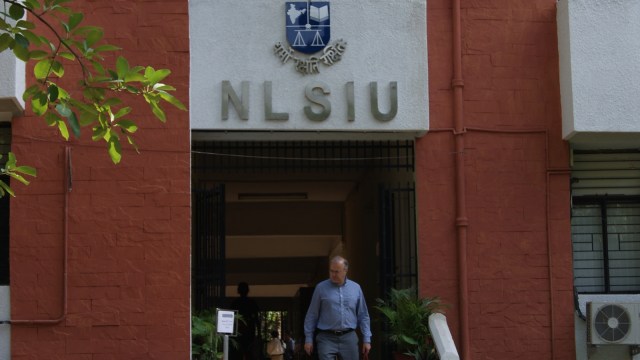Thirty-six years ago, the National Law School of India University (NLSIU) in Bengaluru adopted a game-changing legal education programme in the form of a five-year BA.LLB course which transformed legal education in India. However, with the launch of a three-year BA (Hons) programme from 2025, the institution is now diversifying its academic portfolio with non-legal programmes.
While these initiatives aim to transform NLSIU into a multidisciplinary university, they have raised eyebrows over whether the institution is overstretching its reach and drifting away from its founding principle of being a pioneering legal institution.

Since its inception in 1988, the NLSIU has adopted the five-year integrated BA.LLB programme conceptualised by N R Madhava Menon, who is considered the father of modern legal education in the country. The programme’s interdisciplinary approach, combining law with humanities and social sciences, has been a benchmark for legal education, inspiring other law schools across India.
However, with an evolving higher education landscape and increasing competition from private universities, the NLSIU is now seeking to redefine itself as a multidisciplinary university as part of its expansion plans. In fact, the Karnataka government has agreed to provide additional seven acres of land in the Jnanabharati campus of Bangalore University to NLSIU for a period of 30 years on lease rent basis at Rs 50,000 per acre per annum. Currently, NLSIU is functioning in a 23-acre campus inside the BU campus.
The NLS BA is designed to include a common core series of foundational courses jointly offered to all first-year students across the BA and BA LLB programmes; option of selecting a major-minor track or a double major track in the disciplines of History, Sociology and Anthropology, Politics, Economics; learning a selection of Indian languages; and practice courses in areas such as AI and Machine Learning, Filmmaking, Business Consulting, User Experience Research, Digital Journalism, Creative Writing, Entrepreneurship, Policy Advocacy and Analysis.
NLSIU Vice-Chancellor Sudhir Krishnaswamy said that while the institution made attempts to modify and reshape the curriculum over the years, the changes have not been comprehensive.
“The BA programme in India has traditionally been seen as a generalist degree. Unfortunately, this has often led to weaker academic and graduate outcomes in some universities. While there are some notable successes — such as strong honours programmes at Central universities and a few private universities offering innovative, specialised BA programmes — the overall model has struggled,” Krishnaswamy said.
Story continues below this ad
“At NLS, we aim to reposition the BA as a highly aspirational degree, accessible through a public institution. We are not replicating existing models like those of Delhi University or private universities. Instead we are designing a programme that is responsive to contemporary needs and skill sets and professionally oriented with the demands of the 21st century,” he said.
Dr Mohan Gopal, former Director of the National Judicial Academy, said that transforming legal education with a tinge of multidisciplinary approach should not come at the expense of jeopardising the operations of the legal system.
“I personally feel the study of law has to be interdisciplinary and intersectional. However, it has to be done within the objectives of the NLSIU Act and the founding purpose. The introduction of multidisciplinary programmes must be done within the framework of Article 39A of the Indian Constitution. The Article requires the state to ensure that the legal system operates to promote justice based on equal opportunity. Therefore, any academic programme, legal and non-legal, should be guided by the provisions of Article 39,” Gopal said.
“Introduction of a BA (Hons) programme should not be for the purpose of revenue generation or a profit making enterprise. Instead it should focus on strengthening the operations of the legal system to ensure justice. Additionally, the multidisciplinary programmes should also focus on considering political, social and historical dimensions to ensure justice. At a time when democracy is silenced and the Constitution under threat, it is the role of NLS to prioritise protecting democracy and the law through the business of justice and not the business of education,” he said.
Story continues below this ad
However the university believes that the introduction of the BA (Hons) programme will not have any adverse effect on the efficacy of the integrated five-year BA.LLB programme.
“To address this, let us return to the founding principles of the university in 1988. The university’s success was built on its ability to integrate multidisciplinary education into the study of law. This is evident in the core BA.LLB programme, which combines a Bachelor of Arts and a Bachelor of Laws, excelling in both components rather than focusing on one at the expense of the other. The MPP programme, introduced in 2014, reflects this foundational ethos. As for the new BA programme, it has been designed to complement the BA.LLB programme. From the outset, both programmes have been conceptualised to run in parallel, creating an interconnected academic ecosystem. A strong BA programme enhances the intellectual environment of the university and supports the continued strength of the BA.LLB programme,” Krishnaswamy said.
“The introduction of non-legal programmes like the MPP and BA Honors is not a departure from NLS’s core mission but rather an expansion of its multidisciplinary vision. Far from diminishing the integrated BA.LLB programme, these additions are likely to enhance its relevance and impact by fostering a more dynamic and diverse academic culture,” he said.
Further, the institution also highlighted that the NLS faculty size has seen a three-fold growth in size and has recorded a 235% growth in student body. Additionally, the social science faculty has also seen a five-fold increase with a leaning towards sociology, university officials stated.
Story continues below this ad
Going ahead, the university is also in talks to introduce majors in philology, literature and arts and culture.

































